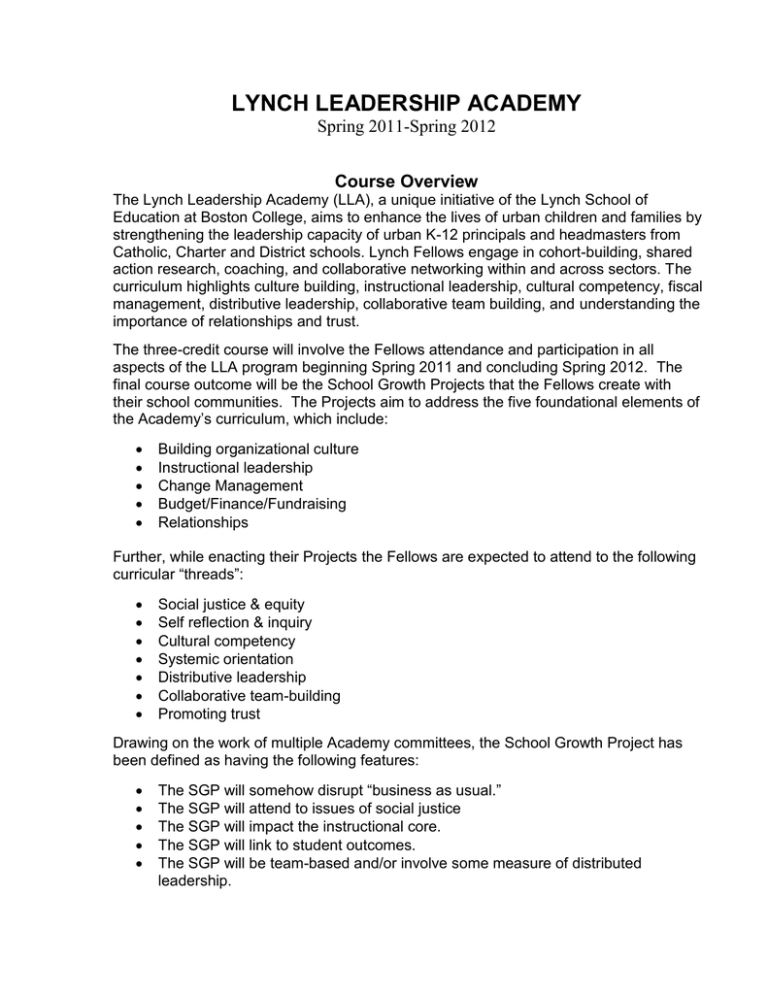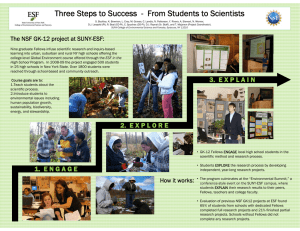LYNCH LEADERSHIP ACADEMY Spring 2011-Spring 2012 Course Overview
advertisement

LYNCH LEADERSHIP ACADEMY Spring 2011-Spring 2012 Course Overview The Lynch Leadership Academy (LLA), a unique initiative of the Lynch School of Education at Boston College, aims to enhance the lives of urban children and families by strengthening the leadership capacity of urban K-12 principals and headmasters from Catholic, Charter and District schools. Lynch Fellows engage in cohort-building, shared action research, coaching, and collaborative networking within and across sectors. The curriculum highlights culture building, instructional leadership, cultural competency, fiscal management, distributive leadership, collaborative team building, and understanding the importance of relationships and trust. The three-credit course will involve the Fellows attendance and participation in all aspects of the LLA program beginning Spring 2011 and concluding Spring 2012. The final course outcome will be the School Growth Projects that the Fellows create with their school communities. The Projects aim to address the five foundational elements of the Academy’s curriculum, which include: Building organizational culture Instructional leadership Change Management Budget/Finance/Fundraising Relationships Further, while enacting their Projects the Fellows are expected to attend to the following curricular “threads”: Social justice & equity Self reflection & inquiry Cultural competency Systemic orientation Distributive leadership Collaborative team-building Promoting trust Drawing on the work of multiple Academy committees, the School Growth Project has been defined as having the following features: The SGP will somehow disrupt “business as usual.” The SGP will attend to issues of social justice The SGP will impact the instructional core. The SGP will link to student outcomes. The SGP will be team-based and/or involve some measure of distributed leadership. Schools, their leaders, and their school communities are all somewhat different so what the SGP looks like in each school will differ. The SGP will be viewed as an ongoing process during which schools will, at regular intervals, assess their progress-to-date and revise their work accordingly. The following cycle will repeat itself: Intervention Assessment Program revision New intervention With the School Growth Project in view, the Summer Institute aims to equip Fellows with the skills and knowledge necessary to enact the Project with their school communities. Specifically, Academy faculty and staff, their leadership coaches, and relevant outside consultants will focus on helping Fellows develop the following skills: Constructing and managing effective teams Having “difficult conversations” Conducting instructional rounds Identifying and collecting relevant data Learning to take advantage of teachable moments and opportunities to promote a common culture Fundraising/Programming/Securing additional resources By the end of the Summer Institute, it is expected that the Fellows will have defined their School Growth Projects. In the Fall 2011, they will implement these Projects and throughout the school year will report on their progress-to-date. The Fellows will give final summary presentation in Spring 2012 at a LLA Roundtable Event. This will serve as an entrée to the second class of Lynch Leadership Academy Fellows, who will then embark on their leadership growth experience and implement a School Growth Project in their schools. An additional note: (1) If you are a student with a disability and will be requesting accommodations for this course, please register with either Kathy Duggan [kathleen.duggan@bc.edu], Associate Director, Academic Support Services, The Connors Family Learning Center (learning disabilities and ADHD), Dard Miller: Learning Resources for Student Athletes: 617-5528533, or Suzy Conway [suzy.conway.1@bc.edu], Assistant Dean for Students with Disabilities (all other disabilities). Advance notice and appropriate documentation are required for accommodations.





